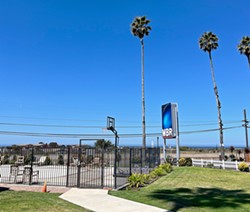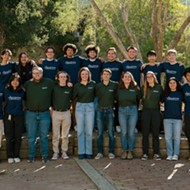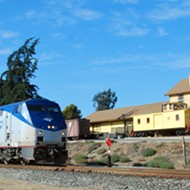[
{
"name": "Newsletter Promo",
"id": "NewsletterPromo",
"class": "inlineCenter",
"insertPoint": "4",
"component": "15264767",
"requiredCountToDisplay": "0"
},
{
"name": "Ad - Medium Rectangle CC01 - 300x250 - Inline Content",
"class": "inlineCenter",
"insertPoint": "8",
"component": "15582119",
"requiredCountToDisplay": "12"
},{
"name": "Ad - Medium Rectangle LC01 - 300x250 - Inline Content",
"class": "inlineCenter",
"insertPoint": "18",
"component": "15582122",
"requiredCountToDisplay": "22"
},{
"name": "Ad - Medium Rectangle 9 - 300x250 - Inline Content",
"class": "inlineCenter",
"insertPoint": "28",
"component": "15582121",
"requiredCountToDisplay": "32"
}]
In a converted motel that overlooks the ocean, Morro Bay Recovery has provided alcohol and drug addiction recovery services for the past year and a half to help reconnect people with friends, family, and the community.
"One of the benefits of having individuals recover from drug and alcohol addiction is for them to be able to be part of the community again, going back to work, going back to school, and also it helps reconnect families," said Morro Bay Recovery Program Director Jack Loussararian.
Now, after providing its services only through private insurance, on Aug. 13 the SLO County Board of Supervisors vetted the recovery center to accept Medi-Cal patients. This means the center can expand from its current 26 beds to 40 by the end of the year.
"We look forward to taking our first Medi-Cal patient soon and just growing from there to help as many patients overall, but especially Medi-Cal patients in the near future. We hope to have this whole place full," Loussararian said.
He said there aren't a lot of recovery services available in San Luis Obispo County, and being near one's community is helpful when healing—that's why the recovery center's location is so important.
"There's definitely a shortage of treatment options in this county, so people would have to go farther and farther away to seek treatment, and that makes it really difficult to integrate back into society or back into regular life," he said.
While admission through private insurance is more streamlined, Loussararian said Medi-Cal takes a few days for approval, and patients should be aware of that timeframe before they can be admitted.
Morro Bay Recovery takes a holistic approach to each person's healing that provides medically assisted treatment during withdrawal and group and individualized therapy sessions.
"This way they have a better understanding of their addiction, their triggers, their coping skills, and the life skills that they need to not use again," he said. "Our goal is lifelong sobriety."
The center also provides each resident with a discharge plan from the day they arrive, determining their support systems and if they will need any additional resources such as a sober facility.
"It just depends on what the individual patient needs. Some do well with sober living, some do well going back on their own, some go back to their family. It just depends," Loussariarian said. "That's why I'd say from day one, we start that plan."
With the help of a small bus, the center can transport its residents to various support groups throughout the county, as well as take them on outings.
"We do hikes, walks on the beach, just to provide them this kind of overall sense of well-being and reconnecting them to things they like to do, reconnecting them to the community," Loussararian said.
A staff member, who wished to remain anonymous, said that there's a particular saying in recovery circles: "The opposite of addiction is connection."
"When people are in active addiction, they tend to isolate, remove themselves from their family communities," the staff member said. "So it's just about bringing people back into connecting with others."
One thing that sets Morro Bay Recovery apart from other facilities is many of the staff are in recovery as well, providing more understanding and empathy between them and the residents.
"That's what gives us motivation," another staff member said. "We hear from clients that it was one of the most positive things of them being here, just getting to relate to people who have been through it before and made it out the other side. I think that's what sets us apart."
Apart from resident services, the recovery center offers a sobering center for members of the public in need.
Loussararian said that police officers, ambulances, and the outreach members from the Salvation Army can drop publicly intoxicated people at the center where they have access to a bed, bathroom facilities, and small-wound medical attention, as well as food, water, and clothing.
A sobering center provides a safe space and alleviates the impact on jail staff and medical professionals, Loussararian said.
"It's a growing concept. The idea is to help them sober up away from these other places where they don't need to be, where they don't need to take up resources and time of the jail or ER staff. They could focus on patients or inmates there who really need to be there," he said.
Fast fact
• The Foundation for California Community Colleges awarded $452,000 in grants to California community colleges to boost nursing programs, one of which was Cuesta Community College. The funding will go toward expanding the college's 12-month pathway for licensed vocational nurses program to address the nursing shortage along the Central Coast. "Grants were awarded to projects that benefit nursing education within the California Community College system specifically by addressing priorities of tackling systemic racism, hiring diverse faculty, creating educational pathways, promoting academic progression, and providing work-based learning opportunities," according to the foundation. Δ
Reach Staff Writer Libbey Hanson at [email protected].
Latest in Strokes & Plugs
Comments
Showing 1-1 of 1









